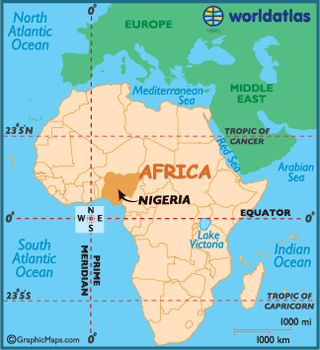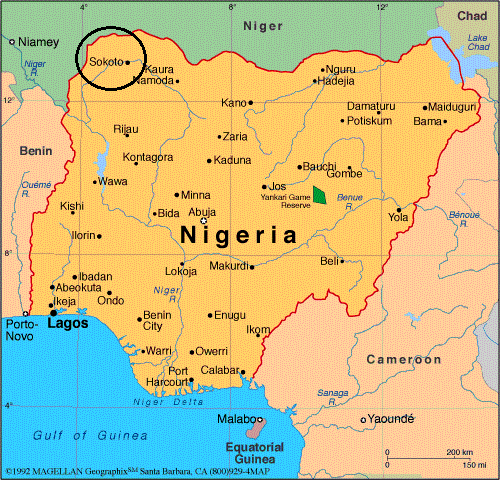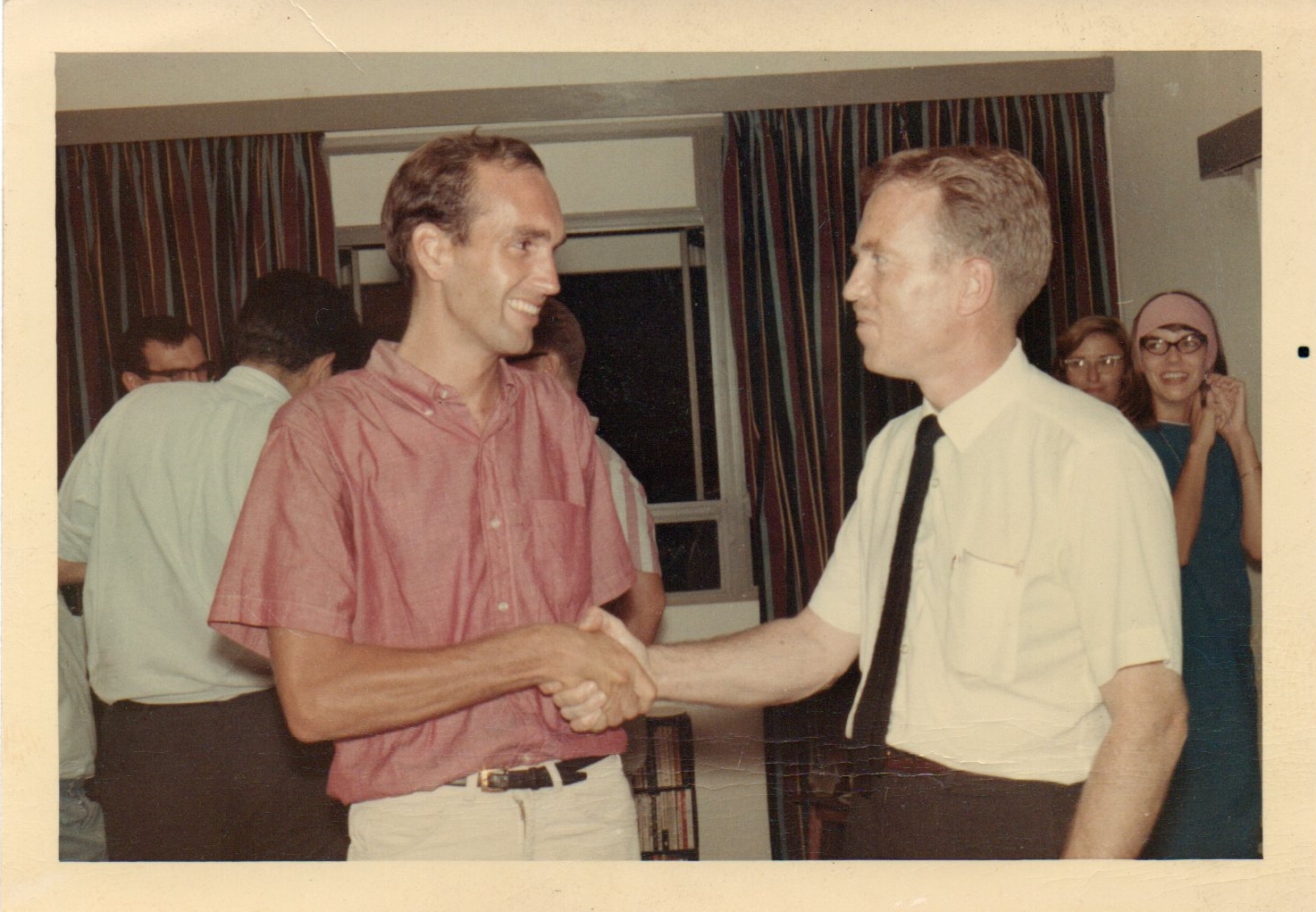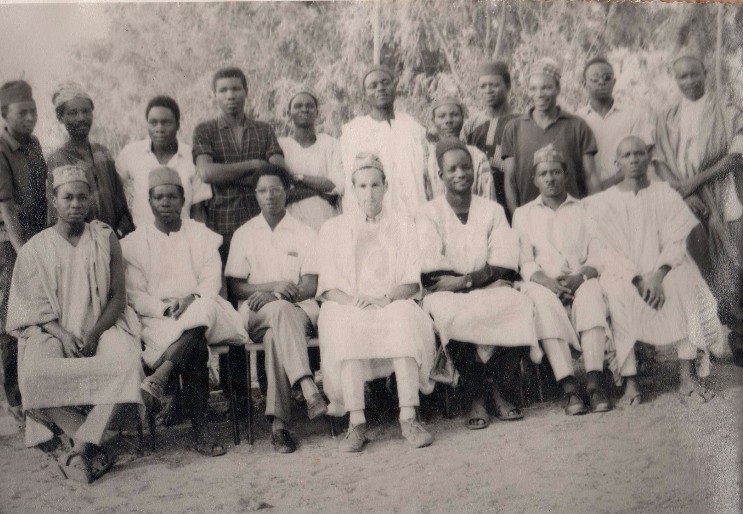What was it like to serve in Nigeria at the start of the Biafran War?
by Jerry Sodomka
 Several months ago I was asked to give a lecture at the local community college about my Peace Corps experience. I prepared a PowerPoint presentation of my many slides and material I had saved from my two years in Nigeria. I decided to read through all my letters home that my mother had saved. I had only read about three-quarters of them previously.
Several months ago I was asked to give a lecture at the local community college about my Peace Corps experience. I prepared a PowerPoint presentation of my many slides and material I had saved from my two years in Nigeria. I decided to read through all my letters home that my mother had saved. I had only read about three-quarters of them previously.
At the lecture I decided to read directly the section from June 5, 1966. I didn’t think I could express it any better than I did 50 years ago. Afterward I continued to pull parts out of my letters concerning the political situation. My first three letters home were the longest letters I wrote and the least self-censored. I have drastically condensed the letters from May 15 and May 25, 1966 only to set the scene. The rest are complete paragraphs with absolutely no editing. There are three non-political interludes that I think will interest other volunteers. Anything in brackets is an addition to help clarify what I originally wrote. Parentheses are original in my letters. I was tempted to edit what I had written, but that would be hindsight. Instead the reader gets exactly what I wrote at the time it happened.
Kaduna, Sunday, May 15, 1966
The flight to Lagos was long and tiring. By the time we arrived in Lagos and got through customs, we were all very tired. [Wednesday, May 4, 1966] We stayed in an air conditioned hotel near the airport. [Those going to schools in the south left the next day.] Those of us going to the Northern region then got our surprise. Our schools don’t start until the end of May, so we are going to take our time getting there. Instead of flying there, we are going up by bus which will take three days. We spent the next three days in Lagos at the PC Hostel there.
We left Lagos on Sunday morning for our trip to the north. There were seventeen PC people, one driver, an assistant driver, a mechanic, and a security guard, the last four Nigerians. It was supposedly a 31 passenger bus, but we were very crowded, what with all of our luggage and a big pile of pillows and linen we were carrying to the new hostel in the north. In the next three days we literally bounced our way over 600 miles to Kaduna. We spent one night in Ilorin and one night in Bida.
Finally arrived in Kaduna, capital of the Northern region. It’s a modern city compared to other cities in the north and has a beautiful Olympic-size swimming pool at the Hamdallah Hotel -- got to use it three times. Stayed in Kaduna for a total of five days. I’m finishing this letter from Sokoto, this is where I’m going to be stationed -- way up in the north-west corner of Nigeria, only about 60 miles from the border of Niger. I’m to be teaching at the Government Craft School. Right now I’m staying with two other volunteers until the arrangements for my housing are completed by the ministry. [This turned out to last almost a year until a house became vacant on the Craft School compound.] The rainy season has not started this far north yet, and it’s the hottest part of the year.
Wednesday, May 25, 1966
Sokoto (long ohs) -- or as the British say “Sockwatoo.” The town itself is mostly mud built, except for the two mosques, the Sultan’s Palace, government buildings, and the European sector, which are concrete or wood. I’ve finally gotten settled into a house and have my suitcases unpacked for the first time in three weeks. I’m living with two other volunteers -- John Egan working in social welfare and Tom Black working in agriculture. [There was a third volunteer, Tom Crane, who terminated the same week I arrived.] The house is on the Federal College compound, about four miles from my school. There was no place for me to live on my own school compound.
Sunday, June 5, 1966
Things were normal enough Saturday night a week ago. Two volunteers, Paul Trotta and Tom McGrew, both who teach at the Arabic School, gave a pizza party. Paul made the pizza -- cheese, mushroom, and sausage – and it tasted just great. And to think I’ve only been here one month [in Nigeria]. The night ended with things normal and quiet in the town. By mid-morning the next day there was rioting and looting going on in several parts of the town. How it started, no one seems to know. I think it was primarily a reaction of the Hausas against the Ibo dominated coup of last January. Most of the rioting in Sokoto took place in the “Sabon Gari” (“new town”), the section where all the Ibo immigrants from the South live. It involved Hausas against the Ibos, looting their homes and shops, destroying their property and driving them out of their homes, and even out of the north if possible.
By Sunday afternoon the whole Sabon Gari was a mess – every window broken, stuff scattered all over the street, looters carrying off property, and Ibo women and children carrying a few possessions and hurrying to safety. By late afternoon there were hundreds of Ibo families congregated in front of the Police Headquarters, either waiting for transportation out of town, or simply there because they had nowhere else to go. There were people killed, both Ibo and Hausa, but no one seems to know how many for sure. Since the Ibos are mainly Christian, and the Hausas are Moslems, all the churches in town were damaged and looted also. So you see the disturbances had not only an undertone of tribal war, but an undertone of religious war also.
On Monday there was a big demonstration in town by Hausas, mainly students. By 7 o’clock in the morning most of our students at the Craft School had left the compound to go into town, even though they weren’t supposed to. The principals of the other schools had a hard time trying to keep the students in class. Jenee Gossard, a girl PCV at the Teacher Training College (TTC), got hit by a student when he tried to leave the class and she ordered him back in his seat.
Well, the inevitable happened when the groups started to march to the government offices. The police ordered them to stop, they refused, shots were fired, and several students were on the ground dead and more were wounded. I know for sure that one student from my school was killed immediately, and that one other died two days later in the hospital. They were both in my classes. A third student from my school is still in the hospital. How many others were killed or wounded? I don’t know. I hear conflicting stories.
Things really didn’t improve much as the week progressed. There was more looting and killing each day. I think yesterday was the first quiet day. Maybe the situation has settled down, at least for a while. Unfortunately what happened in Sokoto was not an isolated event. Riots broke out all over the North – in Kano, Zaria, Jos, Kaduna, Gusau, and many smaller towns.
Reports have it that the whole Sabon Gari of Kano was burned down, that much of Gusau was destroyed, and that the bridge over the river Benue at Makurdi was blown up. I think they’re all probably true.
Though everything is relatively quiet right now, most of the Nigerians on the staff at my school seem to think there will be more trouble, maybe even a counter coup more favorable to the North. One really radical Hausa on the staff talks in terms of a secession of the North or an outright civil war. But he’s an extremist. At least I hope he is.
Don’t start a lot of unnecessary worrying. At this point Europeans are not involved and are in no danger of getting involved. I feel perfectly safe. Some of the English started to panic, but they’re only alarmists. There is on old boy who was all set to lead a convoy of evacuation up to the Niger border. But he tried to do the same thing after the coup. About the only real effect on Europeans right now is that some supplies are hard to get or have already run out. Right now it is impossible to get gasoline in town because all stations are out. There won’t be any until some supply trucks get through. It’s hard to tell when that will be.
August 19, 1966
Well, I suppose you know that Nigeria has had another change of government. I probably don’t know any more than you do. All I know is what I’ve heard over the radio on BBC and Voice of America and what I’ve read in Time magazine. All that happened in Sokoto was that the local radio station stopped giving news and the newspapers stopped coming for about a week.
Everything was pretty normal. I guess the airports in Kano and Lagos were closed, which means, of course, no mail coming in or leaving. They must be open now because I just got the latest issue of Time several days ago. This comes by air through Kano. Anyway, it looks like the North is back in charge of things again. I don’t know whether to cheer or to cry. One thing is sure – the unitary form of government is out. It’s back to a loose federal structure again. It seems to be the only thing that can keep all the minority groups together under one nation.
October 19, 1966
What can I say about the trouble in Nigeria? I’m sure you’ve read the reports in the paper. The massacre at the Kano Airport was really bad. The reports I’ve heard say that the number of killed has reached into the thousands. Kaduna, Zaria, and Jos have been particularly bad. There were a few killings in Sokoto, but other than that, it has been very quiet here.
October 27, 1966
Did you hear that the “Zakin duniya”* of the Peace Corps has made a tour of Nigeria? Jack Hood Vaughn himself made the scene in Sokoto. He and two other PC/Washington officials flew into Sokoto for a day. His main purpose in being here was to assess the political crisis and at the same time find out why there has been so much complaining about the closing of the hostels and about the cutting of our living allowance. In fact, over 40% of the volunteers in Nigeria were committed to a general strike if the demands for a high level conference were not met. So I guess he really came to “calm the rabble.” We had the general meeting with Vaughn at our house (We have the biggest living room). It happened to be a very warm day (95º+), and during the meeting the bugs were embarrassingly abundant. I can still see that three-inch praying mantis crawling up Jack Vaughn’s leg. I wasn’t too terribly impressed by him. He’s very quiet and soft-spoken. In fact, he looked a bit “done-in.”
*Hausa: zaki = lion; duniya = world; i.e. Great Leader
[Vaughn had made a sarcastic comment about our posh living condition. This bothered me. He didn’t know that we had had no running water for more than a month. We were living with buckets of water pulled from a well for cooking and drinking. Nothing for showering or flushing the toilet. Vaughn spent the night and because of a very bad stomach had to frequently use the toilet. There was no water to flush it. We explained in the morning. He looked sheepish and said he hadn’t realized the conditions we were living under. The house was brand new at the Federal College compound. It had been assigned to us by the Peace Corps.]
January 6, 1967
We left Lome on Wednesday morning. There are seven of us traveling back to Lagos, so we all went together in a Peugeot station wagon taxi. It’s just a short ride to the Dahomey border, Togo being only about 35 miles wide. From the border it is then about 60 miles on to Cotonou, the capital of Dahomey.
We were planning to only stay one day here, but have since changed that to three. We all have 48 hour visas only, so we’re hoping we don’t have any trouble at the border when we try to leave. The big news when we got here, and the reason why we’re staying extra days, is that Liz Taylor and Richard Burton are flying in tonight (Friday). Graham Greene’s The Comedians is being filmed here, and the stars are coming in. So we decided to stick around a while to see them. There are several sets being built near the beach, and we talked to a man from Haiti (where the story takes place) who is a special consultant for the film. We are going out to the airport after dinner to see if we can see them (Liz and Dick, that is). [We did see them.] We are definitely leaving for Lagos tomorrow. After a few days there, it’s back to Sokoto.
Monday, April 24, 1967
I left Lagos on Tuesday morning for the Mid-west Region. It’s only about a four hour drive by fast Peugeot station wagon taxis over good, paved roads. The next day I took another taxi to Onitsha in the Eastern Region. The East is the home of the Ibos, who were massacred in the North last year. Since then the East has been slowly cutting itself away from the rest of Nigeria. Crossing the Niger River, which forms the boundary between the Eastern Region and the Mid-Western Region, is like crossing into another country. Very thorough searches of luggage were made, and I was asked innumerable questions about where I was going and what I was doing.
July 20, 1967
The war with Biafra hasn’t really affected Sokoto – we’re too far away from the scene of the action. Of course, the war is all the newspapers talk about, and it’s the main topic of conversation in the staff room. It’s difficult to know what to believe, what with the conflicting claims and obvious exaggerations. My little radio only get two stations -- Radio Kaduna and Radio Enugu (Biafra) – so I least I get both sides, although neither is particularly reliable. I can’t get BBC or Voice of America. The only thing I know for sure is that all expatriates are being pulled out of the East, and I guess that includes Peace Corps too. They may have already been pulled out of border areas.
August 26, 1967
The Kano airport is supposedly closed for “training operations,” but it’s pretty well admitted that huge arm shipments are being flown in, including Russian MiG jets which are being assembled there. Several of the volunteers from Sokoto who were due to go home are having trouble leaving the country because all airline flights have been cancelled.
The news here is that Russian arms and technicians are flooding into Lagos – how true this is I really don’t know. Because that USA has declared itself neutral, the federal government has taken this as support for “Biafra,” and there is a lot of anti-Americanism in the papers and on the radio. In fact, a USAID smallpox vaccination team working in Sokoto province has been accused of being spies for the Ibos. All pretty ridiculous, but it still gives me an uncomfortable feeling.
September 1, 1967
Kano airport is still closed. I’ve heard that fifteen more MiG jets are still to come in and be assembled. I’ve also heard that Russians are openly seen in Kano dressed in tunics with red stars. It would be kind of exciting if some came up to Sokoto. The Nigerian Air Force has started training at the Sokoto Airport with two small single-engine planes. They started flying over the town yesterday, making dives and low passes. I heard some of the people in town really panicked, thinking it was Johnny “Kamikaze” Brown and the famous Biafran B-26 making a bombing run over Sokoto. From the news it appears that the Federal Troops are regaining the offensive, at least slowly. Things are normal in Sokoto.
September 16, 1967
There was a new group of volunteers due to arrive in Nigeria last week. After being held up for two weeks in Amsterdam at the request of Yakubu Gowon, the Supreme Commander of the Federal Government, Peace Corps was asked to hold them another two weeks. Peace Corps refused and sent them packing back to the States. The fall training program was also cancelled, which means there will be no new volunteers for Nigeria for at least six months. The remaining British volunteers (GVSO’s) were pulled out of the country this week. There were three in Sokoto. The incoming Canadian volunteers (CVSO’s) were diverted to Ghana. This leaves ten PCV’s and three CVSO’s in Sokoto.
The latest news in the papers is that the US government is supporting the rebel regime in Biafra by sending American Negro mercenaries. This was reported by Tass. Since a good part of American Negroes are Eastern Nigerian in origin, it was a piece of very clever propaganda by the Soviets. The anti-Americanism has stopped in the papers, but only, I’ve heard, at the request of Gowon. I’ve also heard that the Federal Ministries in Lagos are still seething with anti-US sentiments.
Peace Corps is now lame duck in Nigeria. It may be the beginning of the end. All is quiet in Sokoto.
October 16, 1967
The war has been lost for the rebel Biafrans. With the fall of Benin City and the Mid-West Region, and last week, the capture of Enugu, the Capital of Biafra, it’s only a matter of time before the rebellion collapses. Who knows, by the time you get this letter, the war may be all over. It’s hard to tell from Sokoto that there is still a war going on. Except for the roadblock about a mile down the road from school that is still up and the collection this week at school for the “Troop Comfort Fund,” everything is very normal. There is a steady supply of petrol coming in, and lorries are running regularly.
November 2, 1967
You know something? Of the thirteen teachers at our school, I’ve been at the school longer than all but two of them!! Yes, it’s true. There’s been that much turnover. It hardly makes for continuity, does it? By the time I leave, I may be “senior” on the staff.
January 3, 1968
It looks more and more like Peace Corps is being phased out in Nigeria. Peace Corps/Lagos won’t admit it, but it seems the Federal Military Government just doesn’t want Peace Corps anymore.
March 6, 1968
I made my plane reservation to leave Nigeria – the 28 th of March from Kano.
Saturday, March 23, 1968
Photo: Jerry's going away party. Wearing gifts of robe and hat.
I’m leaving Sokoto on Monday morning. I’ve got a ride to Kaduna, where I have to pick up my money and ticket. I’m going to Kano from there. I should be in Europe by the evening of the 28th .
Well, that’s all from Sokoto. I’ll write from Europe.




